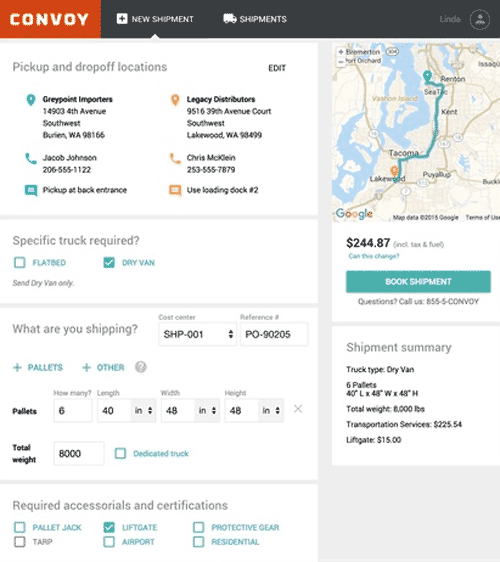The trucking sector was caught a little off guard about 10 days ago when digital freight broker Convoy – touted as a major disruptor with technology to match shippers with carriers – announced it had failed, letting go all but a few of its remaining 500 or so employees. (See Digital Freight Broker Convoy ran Out of Options and Money, Shutters Doors.)
Supply Chain Digest Says...
|
 |
A source told the Journal that said the costs to develop and maintain the technology required revenue that Convoy never achieved, even at the peak of shipping demand during the Covid-19 pandemic.
|
 |
What do you say? |
| Click here to send us your comments |
 |
| |
|
This after an incredible $1.1 billion in investments from private equity firms and others over several rounds - including several celebrity investors – with a new round of financing valuing Convoy at $3.8 billion just 18 previously. That means than other than what can be recovered from an attempted sale of Convoy’s freight matching technology, investors are seeing all their investment value disappear.
In addition to Wall Street-like investment firms, investors in Convoy included Microsoft’s Bill Gates, Amazon’s Jeff Bezos, and Bono and The Edge of the rock band U2.
So what happened?
The Wall Street Journal and reporter Paul Berger published an excellent piece on Convoy’s downfall, which included the fact it was losing $10 million per month recently, and that founders Grant Goodale and Dan Lewis found it was much harder to find a financial white night than they expected, in a new environment in which funding for logistics startups has been reduced significantly.
Operationally, the freight brokerage business convoy was attempting to disrupt, has historically been a low margin business.
Convoy was primarily focused on the supply side matching loads from retailers and manufacturers with small carriers and independent truckers.
“It is a fast-paced business, with profits for brokers coming in the space between the money they charge shipping customers and the rates that truckers charge to haul loads,” the Journal article notes.
Convoy Convoy’s idea was that by automating the load matching process, similar to the way ride-sharing companies link drivers and passengers, the company could take costs out and speed up the time it took.
And early on, a few high-profile shippers such as Anheuser-Busch announced plans to use the platform, seeming to validate the model and ushering in a new era of digital freight matching.
Other firms, including Transfix and Uber Freight, launched similar platforms.
Digital or not, it’s a tough business. The Journal article quotes Jeff Tucker, CEO of New Jersey-based freight broker Tucker Company Worldwide, as saying that Convoy’s technology was best suited to very transactional business—shipments owned by customers that will switch between brokers and carriers for relatively small differences in price.
“It’s trying to make money in the least profitable freight,” Tucker told the Journal, adding that ”There’s zero margin in that and a lot of headaches.”
(See More Below)
Convoy’s business was designed to operate similar to commodity trading, but using algorithms to buy and sell freight loads and trucking capacity.

A source told the Journal that said the costs to develop and maintain the technology required revenue that Convoy never achieved, even at the peak of shipping demand during the Covid-19 pandemic.
The company “didn’t get big enough, fast enough,” the source said, leading to the growing losses that doomed the company.
A related factor: the vast majority of freight moves of course come under contracts between carriers and shippers, not the so-called spot market that the digital startups are focused on.
But until nearly the end Convoy thought someone would come through acquire the company, after pitching the idea to a number of firms, including UPS and brokerage giant CH Robinson.
The Journal says the company came so close to clinching a deal that its executives began mapping out an integration strategy. But the deals fell through, and with about $40 million left at Convoy, that was the end.
Major investor Hercules Capital is now overseeing the sale of Convoy’s assets, including its software.
No comment so far from Gates, Bezos or Bono.
Any thoughts on Convoy going belly up? Let us know your thoughts at the Feedback section below.
|